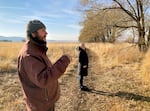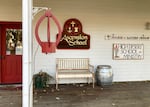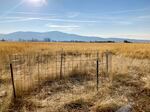Most maps would show that this plot of land is on the banks of Hulick Creek on the west side of Cove in Union County.
But Bobby Fossek said the area had a name before one of the town’s settlers bought it and eventually turned the land over to the Episcopal Diocese of Eastern Oregon: “wewa la tit puh” or “many streams flowing at that place” in the Nez Perce language.

Bobby Fossek of Caretakers of the Land and Ascension School director Amy Jayne stand on a nature trail near Ascension School in Cove, Ore., Nov. 16, 2022.
Antonio Sierra / OPB
Fossek and his partner, Brosnan Spencer, have spent the past three years trying to return these 80 acres to its original state, a wild patch in the placid sea of wheat farms and cattle pastures that surround Cove, a town of 620 people.
The restoration effort is both a starting point for a diocese interested in a more meaningful future with the region’s American Indian tribes and an action meant to demonstrate seriousness in addressing the Episcopal Church’s complicity with centuries of colonization. But on a crisp mid-November day, Fossek and Spencer were just taking a walk among their work.
Fossek stopped by a containment pen erected to keep deer and elk from grazing on its contents. He picks up the stem of a Woods’ rose.
“I could sit here and go on all day just about the rose plant,” he said.
The fruit could be used for teas and jellies, Fossek noted, the leaves and roots for medicine. It could be combined with water and used to cleanse the house after a family member died.
The plant is native to the Grande Ronde Valley and Fossek and Spencer’s vision is to turn the acreage under their stewardship into land teeming with similar flora. Not just Woods’ rose, but chokecherries, elderberries and golden currant. Native trees like cottonwoods, willows and water birch.
Both Fossek and Spencer are members of the Confederated Tribes of the Umatilla Indian Reservation: Fossek is a descendent of the Walla Walla and Yakama tribes and Spencer is Cayuse, Umatilla, Klickitat and Seminole.
For Fossek and Spencer, members of the Confederated Tribes of the Umatilla Indian Reservation, their project is cultural in addition to environmental.
“This whole valley, elders refer to it as our Garden of Eden,” Fossek said. “And the first settlers referred to it as a waste prairie.”
The original settlers are long gone, but their legacy is tied to the Episcopal diocese through Ascension School, a smaller part of the property used to host religious retreats and camps. The diocese plans to continue operating the school while partnering with a couple guided by their tribes’ natural law to transform the rest of the property.
While those ideas have historically been in conflict, it’s in line with the diocese making its new direction official over the fall.
The Doctrine of Discovery — a set of religious edicts that opened the door for global colonization — guided churches and national governments for centuries. Now, the Episcopal Diocese of Eastern Oregon wants to reverse course.
‘The international law of colonization’
The diocese formally repudiated the Doctrine of Discovery at a convention in October.
Standing before clergy and congregants representing the diocese’s 2,000 members, Bishop Patrick Bell reminded the assembly at the Episcopal Church of the Redeemer in Pendleton that the theme of the conference was “Standing on Sacred Ground.” Repudiating the doctrine was not about feeling good about themselves or recruiting new members to the pews, but about something more, Bell said.
“When I chose Standing on Sacred Ground as the theme for this convention, I was after the same idea, to say this ground, this land did not become sacred because Christians brought their crucifix and stuck it in the ground on those beaches,” he said. “It was sacred long before we Christians ever set foot or even imagined being here.”
Repudiating the Doctrine of Discovery was a step the national Episcopal Church took in 2009, but Bell said in an interview that the diocese wanted to pass its own resolution in an effort to build community with its Indigenous neighbors and the three tribes within the diocese boundaries: the CTUIR, the Confederated Tribes of Warm Springs and the Burns Paiute Tribe.
The origins of the doctrine go back to the 15th Century when Pope Eugene IV issued an order authorizing Portugal to colonize the Canary Islands, according to Robert Miller, a law professor at Arizona State University.
“This is really the genesis of this international law of colonization that Christian European countries had a divine right to colonize, settle, exploit, (and) dominate the rest of the world,” he said.
In the years to come, the papacy would continue to grant colonial rights to Spain and Portugal to claim Africa, Asia and the Americas upon discovery, and those papal edicts would influence other European powers using colonization to expand their empires.
It’s also what Chief Justice John Marshall relied on in 1823 when he and the U.S. Supreme Court judged a dispute involving land sold by the Piankeshaw people to settlers.
By that time, the Church of England had split from the Catholic Church but retained the doctrine when the monarchy became the head of both church and state. Marshall ruled that the U.S. inherited the rights of the Doctrine of Discovery from England, meaning American Indians could occupy their own land, but not own it.
The ruling continued to echo in the policies adopted by the American government in the years that followed.
Christian churches of several denominations often worked with the federal government to establish residential schools on reservations with the mission of forcibly assimilating Native children into Euro-American culture. The Episcopal Church, an American offshoot of the Church of England, was a willing participant. The diocese’s repudiation resolution quotes a statement from two national church officials, who note that “while complete records are unavailable,” the Episcopal Church was associated with Indigenous boarding schools in the 19th and 20th Centuries.
Documented boarding schools in Oregon included schools on the Umatilla and Warm Springs reservations.
Bell said repudiating the doctrine at the local level was just an early step in building a relationship with Eastern Oregon tribes.
“If we were going to have any integrity about moving forward with building a relationship with our Indigenous siblings and supporting them in their work of reclaiming their own sovereignty and life together, we needed to, in a sense, do our amends by starting there and saying, ‘This is wrong, and we don’t think it should continue in any form,’” he said.

Ascension School is owned by the Diocese of Eastern Oregon and is located in Cove, Ore. Nov. 16, 2022.
Antonio Sierra / OPB
Caretakers of the Land
Fossek hadn’t been to Ascension School in years when he heard about a volunteer clean-up day at the property.
Fossek’s family had deep roots in the Grande Ronde Valley and he had even attended camp at Ascension School as a child. In the intervening years, he and his family bounced around from the Umatilla Indian Reservation to Florida to a cabin near La Grande.
When he returned to Cove in 2015, he found a group of people in the church who were already acknowledging their past while still seeking how to take the next step.
“(It was) a good intention, but no one really knew which direction to go in,” he said. “Being that we’re a Native family that stumbled into this conversation, it naturally went in that direction of ‘Well, perhaps your family can help guide us along.’ And so we ended up moving out here and taking on work here at the Ascension School.”
By the time Fossek, Spencer and their daughter relocated to Cove, the plum and cherry orchards planted by the property’s original settlers had mostly become wheat fields. The diocese hired Fossek to act as a maintenance worker at Ascension School, but the job evolved.
“It just kept becoming more and more clear that if you want to start to make amends with the people and the land and the waters, then a good start would be to stop farming the 80 acres here and begin bringing back some of that native habitat since these streams are all traditionally fish-rearing habitat and this is a traditional village site,” Fossek said.
The conservation effort ramped up in 2019 when the diocese ended its lease agreement with the wheat farmer and turned over stewardship duties to Fossek and Spencer.
The pair formed a group called Caretakers of the Land and began the slow, deliberate process of transforming the land. The Caretakers and the diocese built a walking trail that looped around a portion of the property, the other section was closed to the public and focused entirely on conservation.
While the wheat fields faded away, Fossek and Spencer have been careful not to completely eliminate every non-native plant they encounter. Although it may not fit the long-term picture, some plants still provide grazing to deer, resting spots for migratory birds and shade for fish in the creeks.
“There’s a lot of patience that has to be involved,” Spencer said. “When you’re working on land, the land actually is more working on you than you’re working on the land. So it does a switcheroo on you that you don’t expect.”
Many of the resources the Caretakers are trying to protect fit in with the CTUIR’s concept of First Foods. The First Foods — salmon, roots, berries, deer and elk — have fed Northwest tribes for thousands of years and serve as a cultural and spiritual touchstone for the Umatilla, Walla Walla and Cayuse peoples.
First Foods are also a motivating factor for many of the tribes’ environmental protection efforts. While the CTUIR government isn’t officially involved with the Ascension School project, Fossek said the project has earned a grant from a tribal foundation and he has consulted with the tribes’ Department of Natural Resources.
The Caretakers work closely with Ascension School director Amy Jayne, who said the diocese still has “a really long way to go” even as it gets the restoration project off the ground.
“I think it’s probably just a starting point. It’s so minute, compared to the massive work that needs to be done with the white community, the non-Native community, with our Indigenous neighbors,” she said.
Fossek said there’s little in the way of instant gratification when doing the restoration work. But both sides seem committed to a long-term payoff. While the Caretakers are currently sponsored by the diocese, he would eventually like to turn it into a permanent nonprofit.
Truth and conciliation
There is a quick note in the diocese’s October resolution about reparations. The note states that any discussions about reparations don’t necessarily mean money or land.
“The root word of the reparation is ‘repair,’” said Bell, the Eastern Oregon Bishop. “This means to mend, put back together or in order, return to sound, good or complete condition. We are referring to this true use of the word and not necessarily the historical use inferring compensation.”
Beyond the Ascension School project, church officials are eager to plan further action. But they’re still trying to figure out what that looks like.
The diocese appointed Roy Green, a retired priest who worked in Bend and Hood River, to a truth and conciliation commission to continue the work after the diocese’s October convention.
“It was suggested to us that ‘truth and reconciliation’ was a good name for the commission,” he said. “But some of the Native people have said, ‘Wait a minute, reconciliation means there was a good relationship and it was broken and now we’re reconciling. They said, ‘There’s never been a good relationship, so we can’t say reconciliation and be honest.’”
Seeking “conciliation” meant building a spirit of cooperation that would lead to a healthy and lasting relationship, he added.
Green said he could see the diocese getting more involved in tribal events or standing with tribes on issues important to them like the protection of sacred sites.
But the diocese didn’t want to impose the church on the tribes they’re looking to work with either, Green said, adding that they’re waiting for invitations from tribal elders before officially visiting reservations and beginning talks.
Miller, the law professor, has observed and sometimes participated in repudiations made by other Christian denominations and organizations like the national Episcopal Church and the World Council of Churches. The Ascension School project, he said, is another step forward.
“The Episcopal Church Diocese of Eastern Oregon is considering making changes in the operation of lands they own,” he said. “That is taking their resolution a lot farther than it just being a piece of paper that says something about the Doctrine of Discovery.”
But the changes within these churches and congregations don’t change the reality of the American government.
“I applaud everyone involved in doing this and the decisions that these various churches have made,” Miller said. “But this is certainly not the end of some process. It doesn’t change law. So it will take a coordinated active movement to change the law if we want and to get the United States out of the business of Indian nations properties and rights.”

The Caretakers of the Land erected a pen around Woods' rose plants to protect it from grazers near Ascension School in Cove, Ore., Nov. 16, 2022.
Antonio Sierra / OPB
Genesis and the Garden of Eden
Jayne, the Ascension School director, said working with Spencer and Fossek led her to rethink the book of Genesis.
In the Bible, humans were created only after animals and plants were made first. That meant humans were incapable of living without them, she said.
“I was taught that from a young kid, that this earth is going to be gone someday,” Jayne said. “We may as well just use whatever we want from it and exploit it for our own goods. We’re No. 1. But it’s OK to be changed and change our mind and say, ‘This is wrong. It’s not working.’”
The CTUIR’s history of its own peoples places water, rather than people, at the center of creation.
“Water was created first, life and land were created next, land promised to take care of all life, all life promised to take care of the land,” the tribes’ website states.
Spencer said her and Fossek’s work is guided by tamánwit, the natural law of the land. The roots of a tree nourished the soil, strengthening the banks of the creek and cleansing the water. She said humans bore a similar responsibility to the rest of the natural world.
“It’s reciprocity, which is our promise from the beginning of time,” she said. “When that promise is broken, that’s when we started to see the imbalance and that’s where we’re at right now. We’re trying to remember what it is to be here in a good way together. All of us together. It’s not going to happen overnight.”
By working these few dozen acres, Fossek and Spencer want people to see the responsibility they have to the water and life that sustains them. And by turning away from the Doctrine of Discovery and turning over land to new stewards, the Episcopal Diocese of Eastern Oregon is trying to reckon with the responsibility humans have to each other.